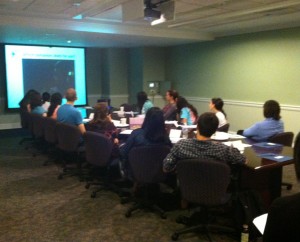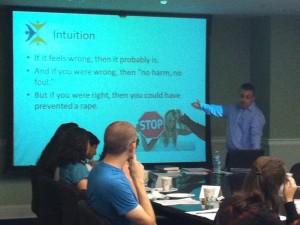By Mark DeNoble
Newcomb Hall Board Room
On Sunday October 6, 2013, I had the privilege of facilitating an interactive workshop that aimed to raise awareness in an attempt to combat sexual assault and change the culture of violence against women on college campuses. This workshop was made possible by a generous grant from the Yeardley Love Endowment. The workshop was dedicated to the memory of Yeardley Love and aimed to teach students to “Be One for Change” so that incidents of sexual or relationship violence are not ignored, and that students will be better able to identify and address these situations.
I am happy to report that the workshop was filled to capacity, with twenty students attending and several on the waiting list. The student attendees were a diverse group, and included students from the College, Engineering, Law, and Nursing. In addition, there were five minority students, 3 members of ROTC, and two males in attendance. Participants learned about identifying warning signs and preventing assault, and how to empower themselves and others when dealing with the aftermath of assault.
 The participants engaged in five learning modules that included lecture, discussion, and activities in these areas:
The participants engaged in five learning modules that included lecture, discussion, and activities in these areas:
1. Awareness
2. Intervention
3. Advocacy and Accompaniment
4. Basic Counseling Skills
5. Dating a Survivor
It is my hope that this group of trained students will be leaders in our community who work to overturn the culture of violence against women. They will serve as model students who are knowledgeable in the options available to sexual assault survivors, capable of guiding survivors through the process of recovery, and adept at easing some of the burden on those who have been wronged by others.
 I believe that in response to sexual assault, many people think, “Thank goodness there is someone out there who handles these issues,” but the truth is we are all responsible for the actions of our fellow community members. My message to students is that they need to help one another, and if they see something, they should say something. If someone discloses that they have been assaulted, or are struggling with the issue in silence, friends should take responsibility to help. They should make it clear that their dorm, sorority, or campus is a safe place. The primary responsibility of a survivor of sexual assault is to heal. When friends support survivors in the post-recovery process, they allow survivors to focus on healing, while lessening the burden of any bureaucratic processes they may encounter. Friends can escort one another to the hospital, police station, or dean of students’ office to make sure she is receiving necessary and fair treatment.
I believe that in response to sexual assault, many people think, “Thank goodness there is someone out there who handles these issues,” but the truth is we are all responsible for the actions of our fellow community members. My message to students is that they need to help one another, and if they see something, they should say something. If someone discloses that they have been assaulted, or are struggling with the issue in silence, friends should take responsibility to help. They should make it clear that their dorm, sorority, or campus is a safe place. The primary responsibility of a survivor of sexual assault is to heal. When friends support survivors in the post-recovery process, they allow survivors to focus on healing, while lessening the burden of any bureaucratic processes they may encounter. Friends can escort one another to the hospital, police station, or dean of students’ office to make sure she is receiving necessary and fair treatment.
We all are responsible for changing the culture of violence in our society. My organization proposed a program that would train peer advocates who could assist students on an individual basis and change culture through their presence on Grounds, and by creating more programs that increase sexual assault awareness. Thanks to the Yeardley Love Endowment Grant and Kappa Alpha Theta, this project has been kick-started and I am proud to say that we have begun helping those affected by sexual violence. Survivors do not just recover, they learn to thrive. And Kappa Alpha Theta has made this possible.
-Mark DeNoble is a doctor of higher education administration and nationally certified counselor. He is director of DeNoble University Counseling Services, where he specializes in working with college students using a holistic approach to student counseling and development. He can be reached at (434) 906-7383 or at denoblmx@dukes.jmu.edu.
